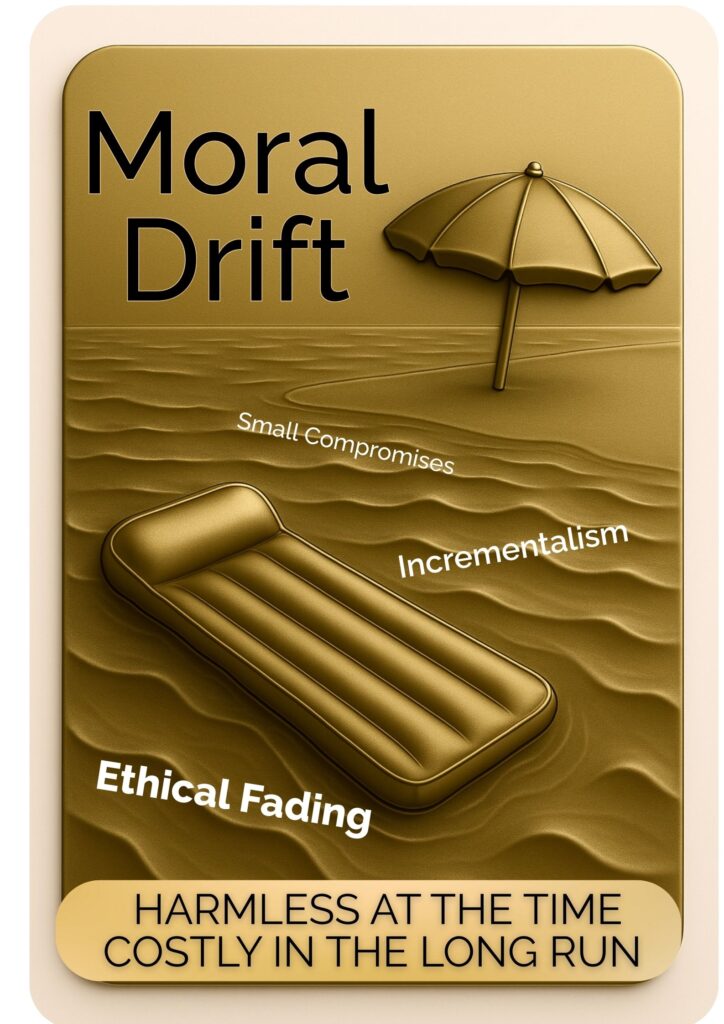Win at Life

What it is – and why it’s useful
Moral Drift is the gradual slide in our behaviour that happens when we make small compromises. Each one might be tiny and feel harmless at the time. Like floating gently on a lilo, barely moving, until you look up and can’t even see your parasol anymore on the beach. You don’t notice the movement straight away.
That’s the nature of drift – it’s slow, subtle, and easy to justify in the moment.
Psychologists call this Ethical Fading (Tenbrunsel & Messick, 2004): the way the moral dimension of a decision fades from view, unnoticed – as we rationalise it away.
In short, we are really good at making up stories to let ourselves off the hook!
It also connects to Incrementalism, sometimes called the slippery slope effect, where a series of small steps makes behaviour feel normal that we would never have chosen outright.
Brought together under the umbrella of Moral Drift, these theories explain why even people with the best intentions can end up doing things they never thought they would.
This isn’t about being weak-willed, lazy or mean; it’s about being human in an environment full of nudges, pressures, and habits constantly in the mix.
Recognising drift means you can notice early when you’ve started to slide off track, and gently steer yourself back before you’re carried so far you find yourself saying things like “Who even am I now/Not my finest hour, etc”
Real-life examples
- At work, you stay silent when someone cuts corners for clients, telling yourself, “It’s none of my business, don’t get involved.” Soon, you’re looking the other way when it becomes the norm, and you’re part of a culture you never meant to join.
- With your health, you skip one planned run because you’re tired. Then another because you’re busy. Before long, the habit you worked so hard to build has slipped away, replaced by something you never deliberately chose.
- In a relationship, you let a small unkindness or disrespectful comment pass instead of addressing it. It happens again, and then again. The friendship or partnership gradually changes into something you no longer recognise, or want.
- Around money, you tell yourself you’ll dip into savings “just this once.” Then again, and again. Suddenly, the buffer you felt secure with has disappeared, and so has your sense of control or ‘adult-ness’.
- Online, you watch a video that’s gossipy or pokes fun at someone. It feels harmless in the moment, but soon your feed is serving you more of the same. Before long, you’re surrounded by content that doesn’t reflect the kind of person you want to be.
- As someone who cares about the environment, you start the new year intending to reduce waste or cut unnecessary plastic, but it feels easier not to bother “just this time.” By May, the habit of making greener choices has drifted out of sight.
Try this today
Choose one area of your life where you’ve felt a drift. Write down what your original standard or intention was. Then ask yourself honestly where you are now.
Even just naming the gap is powerful, because drift depends on you not paying attention. Once you see it, you get to do something about it.
Some things to think about
- Are your current habits and standards genuinely chosen, or are they the result of small compromises stacking up?
- Where have you tolerated “not ideal/suboptimal” for so long that it’s become the default?
- Is there a part of your life where you’d be embarrassed to explain how far you’ve drifted if someone compared it to your original intention?
- What’s one small, but clear, course correction you could make this week to bring yourself back in line with what you value?
- Do you have people around you who would spot your drift, …and be brave enough to tell you?
- How might you set up reminders or rituals (a weekly journal review, a checklist, or even a conversation with a straight-talking friend) to help you notice drift earlier next time?
Optional challenge
For the next seven days, pay attention to when you say things like: “just this once”, “one won’t hurt”, “I’ll do it next time”, or “I’ll let it go”. Whenever you notice, pause and ask: is this an intentional choice, or the start of a moral drift?
Think of it as glancing back to check your parasol and flip-flops are still in sight before the tide carries you further than you realised.
A Buddh-ish take
“The small drops of water, if they continue, will fill a jar. The wise understand that small deeds, repeated, shape a life.” -Dhammapada.
Just like the tide, it’s the repeated pull of temptation, convenience, or fear that can shifts us. Awareness lets us paddle back before the shore disappears from view.
Back to Mindset Mechanics <
Back to The Vault <
References
- Tenbrunsel, A. E., & Messick, D. M. (2004). Ethical Fading: The role of self-deception in unethical behaviour. Social Justice Research, 17(2), 223–236.
- Welsh, D. T., Ordóñez, L. D., Snyder, D. G., & Christian, M. S. (2015). The slippery slope: How small ethical transgressions pave the way for larger future transgressions. Journal of Applied Psychology, 100(1), 114–127.

